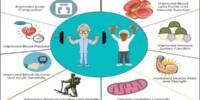A healthy pregnancy routine can result in a healthy heart in the baby. Obesity during pregnancy may increase the risk of infant heart disease. Eating a healthy diet and exercising while pregnant can reduce the risk of heart problems in the baby. A new study suggests that obese mothers can protect their child’s heart health by following a healthy diet and exercising.
A new study has discovered that a lifestyle intervention of diet and exercise during pregnancy protects against cardiovascular risk in infants. The study, which was funded by the British Heart Foundation and published recently in the International Journal of Obesity by researchers from King’s College London, discovered that 3-year-old children were more likely to exhibit risk factors for future heart disease if their mother was clinically obese during pregnancy. This risk was reduced through behavioral lifestyle intervention.
More than half of the women attending antenatal care in the United Kingdom are clinically overweight or obese. Obesity during pregnancy is associated with cardiometabolic dysfunction in children, and serious cardiovascular disease may begin in the womb, according to growing evidence.
Maternal obesity appears to adversely impact the developing fetal nervous system and fetal heart development which is apparent up to 3 years of age. Complex lifestyle intervention in pregnancy was associated with protection against cardiac remodeling in infants. We can hypothesize that these changes to the heart and its function will get worse over time, putting the child at increased risk of cardiovascular disease in the future.
Dr. Paul Taylor
The UPBEAT trial, conducted at Guy’s and St Thomas’ NHS Foundation Trust, randomly assigned obese women in early pregnancy (BMI greater than 30 kg/m2) to a diet and exercise intervention or standard pregnancy care. One-on-one counseling, limiting saturated fat intake, eating foods with a low glycemic index, such as vegetables and legumes, moderate and monitored physical activity, and exercise tracking tools were all part of the intervention. The intervention arm saw improvements in weight gain in pregnancy, physical activity, a healthier diet, and a healthier metabolic profile across pregnancy.

Follow-up of the children at three years of age showed that children of women with clinical obesity had evidence of cardiac remodelling, a risk factor for future cardiovascular disease. Changes included increased heart muscle thickness, elevated resting heart rate, evidence of early impairment to the heart’s relaxation function, and increased sympathetic nerve activity (‘fight or flight’ response) compared to women of normal weight. The children of women who were allocated to the intervention arm were protected from these early changes in heart structure and function.
Study lead Dr. Paul Taylor, from King’s College London, said: “Maternal obesity appears to adversely impact the developing fetal nervous system and fetal heart development which is apparent up to 3 years of age. Complex lifestyle intervention in pregnancy was associated with protection against cardiac remodeling in infants. We can hypothesize that these changes to the heart and its function will get worse over time, putting the child at increased risk of cardiovascular disease in the future.”
According to the study, maternal obesity may have a long-term impact on the child’s cardiovascular health. This risk may be reduced by encouraging dietary changes and physical activity during pregnancy.
















